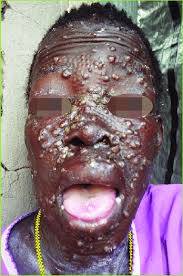Monkeypox in the Democratic Republic of Congo: A Growing Concern
The Democratic Republic of the Congo (DRC) has been grappling with various infectious diseases for decades, but the recent resurgence of monkeypox has raised significant public health concerns. With its rich biodiversity and a high incidence of zoonotic diseases, the DRC is uniquely vulnerable to outbreaks of this viral illness.
Overview of Monkeypox
Monkeypox is a viral disease that is similar to smallpox but generally less severe. It was first identified in laboratory monkeys in 1958, hence its name. The disease is caused by the monkeypox virus, a member of the Orthopoxvirus genus. It primarily spreads through direct contact with infected animals, such as rodents and primates, but human-to-human transmission can also occur through respiratory droplets and contact with bodily fluids.
Current Situation in the DRC
The DRC has reported a significant number of monkeypox cases in recent years, with health authorities struggling to manage outbreaks. The country accounts for a substantial portion of global monkeypox cases, highlighting its ongoing challenges in surveillance and response. The Ministry of Health has confirmed multiple outbreaks, particularly in rural areas where contact with wildlife is more common.
Factors contributing to the high risk of monkeypox in the DRC include ecological, social, and healthcare-related issues. The DRC's vast tropical forests serve as habitats for many animals that can carry the monkeypox virus. Additionally, cultural practices that involve hunting and consuming wild animals increase the likelihood of zoonotic spillover.
Public Health Challenges
The DRC faces several public health challenges that exacerbate the monkeypox situation. First, there is a lack of robust surveillance systems to monitor outbreaks effectively. In remote areas, healthcare facilities are often under-resourced and struggle to provide adequate diagnostic and treatment services. This results in underreporting and delays in recognizing outbreaks, allowing the virus to spread unchecked.
Second, the healthcare system in the DRC has been under significant strain due to other endemic diseases such as Ebola and malaria. The overlap of these health crises complicates the response to monkeypox, diverting resources and attention away from controlling its spread.
Additionally, misinformation about the disease can hinder public health efforts. Some communities may not recognize the symptoms of monkeypox or understand the importance of seeking medical care, further complicating control measures.
Socioeconomic Factors
Socioeconomic conditions in the DRC also play a critical role in the spread of monkeypox. Poverty, limited access to education, and inadequate infrastructure all contribute to a population that is vulnerable to infectious diseases. Many people live in close proximity to animals and engage in subsistence farming and hunting, increasing the likelihood of zoonotic transmission.
Efforts to improve public health education are crucial in addressing these challenges. Community engagement initiatives can help raise awareness about monkeypox, its transmission, and the importance of reporting symptoms to healthcare providers.
Strategies for Control
To effectively manage the risk of monkeypox in the DRC, a multi-faceted approach is necessary. Enhancing surveillance systems to quickly identify and respond to outbreaks is essential. This includes training healthcare workers to recognize monkeypox symptoms and improve diagnostic capabilities.
Vaccination strategies may also play a role in controlling monkeypox. While there is no specific vaccine for monkeypox, the smallpox vaccine has shown some efficacy in preventing the disease. In outbreak situations, ring vaccination strategies, targeting close contacts of infected individuals, can be implemented to curb transmission.
Furthermore, addressing the broader socioeconomic factors that contribute to the vulnerability of communities is vital. Investments in healthcare infrastructure, education, and public health campaigns can help strengthen resilience against monkeypox and other infectious diseases.
Conclusion
The high risk of monkeypox in the Democratic Republic of the Congo highlights the intricate interplay between ecological, social, and healthcare factors in managing infectious diseases. By enhancing surveillance, improving public health education, and addressing underlying socioeconomic issues, the DRC can take significant steps toward mitigating the impact of monkeypox and protecting public health. Collaborative efforts at national and international levels will be essential in building a more robust response to this ongoing health challenge.




No comments yet
Be the first to share your thoughts!